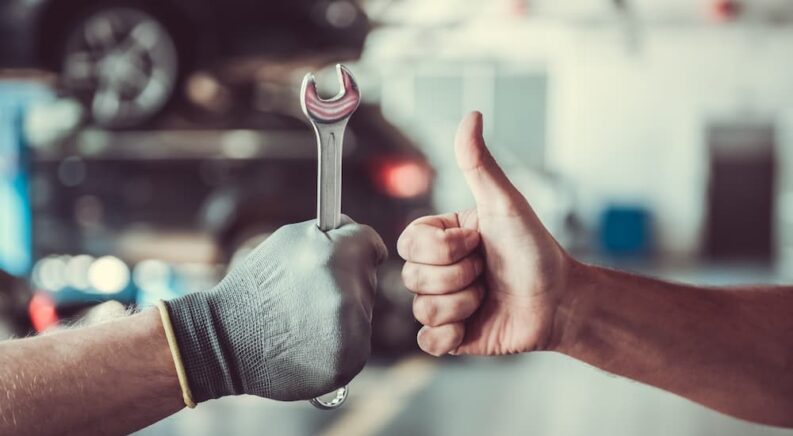Whether you are switching to a new manufacturer for your vehicle, you’ve moved to a new city, or you’re owning your first car, there are several reasons you might find yourself having to locate a new auto repair shop. For most drivers, finding a new auto repair shop is an overwhelming process. When you lease a new car or own a new vehicle that’s still under warranty, some routine maintenance and service might still be covered. But, when you buy a used car, your vehicle has outlasted its warranty, or you’re looking to get something repaired or replaced, you can feel like you’re on your own. Because there can be such a huge variance in pricing and you are (probably) not a mechanic, it can be difficult to know when a mechanic is trustworthy.
Nobody wants to be taken advantage of, overcharged, or charged for things they did not need. But, when an issue comes up for your vehicle, you can find yourself feeling desperate. If you don’t already have an auto shop you trust, you might make a panicked decision and go to the first one you drive by. This could mean a huge bill you weren’t expecting – and maybe repairs that aren’t properly handled. It’s a good idea to find your trusted auto repair shop before a major issue comes up. The question is: how do you do that? Here are questions to ask an auto shop during the vetting process, plus other useful tips for identifying a great auto body shop.
Questions to Ask an Auto Repair Shop
To find a great auto repair shop, research is key. You don’t want to find yourself going to just any shop out of desperation. Set aside some time to do some online research and pick out a few notable locations. Whether you’re just exploring your options or need immediate service, it is important to ask shops these questions to make a final decision.
Do They Use Original Equipment Manufacturer Parts?
Depending on the vehicle you drive or your personal preference, you might only want to work with an auto shop that uses original equipment manufacturer parts (OEMs). In many instances, a non-OEM part will work just fine for your vehicle. However, some drivers like knowing that a mechanic will replace their part with the exact same part the manufacturer put in there. It’s the only way to be 100 percent certain the part will be compatible with your vehicle and deliver optimal performance. If this matters to you, tell the mechanic what model you have and ask if they carry OEM parts for it.
Do They Specialize in a Certain Manufacturer or Model?
This isn’t always important, but if you have a rare model, you might want to work with someone specializing in it. Only a mechanic who is an expert in your unique model will know the specific issues that come up and the best ways to care for it. You might also want a specialist if you drive something other than a traditional commuter vehicle. For example, if you drive a heavy-duty pickup that you use for towing large equipment or if you drive an off-road vehicle that you take off-roading a lot, you might be best off working with someone who specializes in these types of vehicles because they face their own unique sets of challenges.
Is Their Work Under Warranty?
Always ask if the mechanic’s work will be under warranty, how long it is, and what it covers. You should not be on the hook for shoddy workmanship. If you drive off the lot and find that the repairs were inadequate or something wasn’t addressed, you should be able to take the vehicle back and get it repaired at no extra cost to you.
Will They Provide an Estimate?
Any trustworthy mechanic will give you an estimate for their proposed work. It is just an estimate, and the final work might cost more or less than what was in the estimate. But, there should never be a huge variance between the estimate and the final cost. An honest mechanic will always give you an estimate. If they refuse to do this, run for the hills – this mechanic probably wants to throw in lots of unnecessary and over-priced work that you didn’t sign off on.
Can They Speak Your Language?
Not English, Spanish, or Swedish – but civilian. It’s important to work with a mechanic who can explain things in terms you will understand. You are not a mechanic (if you were, you wouldn’t be hiring one), which means you do not understand auto repair shop jargon. You deserve to completely understand the work that will be done on your vehicle and why it’s necessary before paying for it. A good mechanic will be able to explain this to you in a way that makes sense.

General Tips for Finding a Great Auto Repair Shop
Sure, anyone can search Google for a few local shops, but how do you know if one is worth further investigation? This is where research plays an important role. Besides just exploring shop websites, you should be looking over their reviews and qualifications. Sometimes, simply asking friends and family can produce some great options.
Get Referrals
Getting referrals is a good idea for just about any type of service professionals you pay for, from dentists to hairdressers to mechanics. It can be especially reassuring to get a referral from someone you trust (and someone whose vehicle seems to be working well) for a mechanic. If someone you trust can tell you they’ve worked multiple times with the same mechanic and received a) fair pricing, b) open communication, and c) solid repairs, that’s a great sign.
Review the Reviews
If you can’t get a personal referral – maybe you just moved to the area and don’t know anyone – there are always online reviews. However, look at these with a critical eye. If a shop has thousands of five-star reviews, many could be fake, or the shop might have offered customers financial incentives to write the reviews. It’s always a good idea to filter for the negative reviews. A one-off negative review probably means nothing, but if you see the same complaint repeatedly, that’s a red flag. Specific things to look for in reviews are comments about how quickly the shop works, how transparent they are about pricing, how hard they hit the upsells, and how reliable their work is.
Check Their Credits
Not their credit score – their certifications. Any good mechanic will have certifications from the Automatic Service Excellence (ASE). The ASE is a series of certifications a mechanic can get for each body style, and they are the industry standard for a trustworthy mechanic. The eight core certifications are below:
- A1 Engine Repair
- A2 Automatic Transmission/Transaxle
- A3 Manual Drive Train and Axles
- A4 Suspension and Steering
- A5 Brakes
- A6 Electrical/Electronic Systems
- A7 Heating and Air Conditioning
- A8 Engine Performance
If your mechanic carries the ASE certifications, they will likely have these hung up somewhere in their office.
Start With Something Small
If you’ve narrowed it down but are still not entirely sure who you want your mechanic to be, you can always take them for a test drive. This means bringing your car in for something minor. This way, you can see if they do a good job, charge you fairly, and are good communicators. How they handle the small stuff is how they’ll handle the big stuff.

Having a Mechanic You Love Makes Vehicle Ownership a Lot Easier
In the same way you don’t want to be looking up your nearest urgent care for the first time when you’re sick or injured, you shouldn’t wait to look into a mechanic when you have a pressing issue with your vehicle. That’s when you’re more likely to overlook details and overpay for the work. In all likelihood, you’ll be driving for many, many years. So, it’s well worth the effort to do your research and find a mechanic you trust. You’ll return to them time and time again, and it’s nice knowing when you drop off your vehicle that you won’t be faced with any surprises.
Not all auto repair shops are made equal. Asking the questions designated above and following the tips can help you filter out the duds from the studs. Paying for some repairs on your vehicle over the years is unavoidable. Being scammed is completely avoidable – if you do your research.

